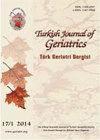Effects of the Stay at Home—Take a Step project for sedentary elderly persons in the Covid-19 pandemic: A randomized controlled study
IF 0.3
4区 医学
Q4 GERIATRICS & GERONTOLOGY
Turkish Journal of Geriatrics-Turk Geriatri Dergisi
Pub Date : 2023-06-01
DOI:10.29400/tjgeri.2023.348
引用次数: 0
Abstract
Introduction: During the Covid-19 pandemic, a program was developed to encourage older adults, the population likeliest to become sedentary due to stay-at-home policies, to remain active. The aim of the current study was to investigate the effects of the average number of steps taken daily on quality of life and stress levels. Materials and Methods: A randomized controlled study selected 69 participants aged 65 and over (mean 69.39 ± 4.61)—35 in the intervention group and 34 in a control group—and their sociodemographic data were collected. The stay-at-home step program was applied to the intervention group. Quality of life, stress level, and body mass index were assessed pre- and post-test, and their daily step counts were recorded. Results: A significant correlation was found between number of steps and the quality of life scores in the intervention group (p<0.05). There was a significant difference between the groups in favor of the intervention group in the mean number of steps in weeks 4 and 8 of the intervention (p<0.05). The mean number steps 2024.71±605.18 in intervention, 1946.63±511.37 in control group. Conclusion: The study found that the Stay at Home—Take a Step program was effective in increasing the number of steps taken daily by elderly participants who were inactive during the Covid-19 pandemic and initiated an improvement in their quality of life. Healthcare professionals who play a central role in supporting the elderly can be advised to use the program to promote healthy aging and physical activity. Keywords: Aged; Physical Activity; Exercise; Quality of Life.2019冠状病毒病大流行期间居家“走一步”项目对久坐老年人的影响:一项随机对照研究
导语:在2019冠状病毒病大流行期间,制定了一项计划,鼓励老年人保持活跃。由于居家政策,老年人最有可能久坐不动。目前这项研究的目的是调查平均每天走的步数对生活质量和压力水平的影响。材料与方法:随机对照研究选择69例65岁及以上(平均69.39±4.61)的参与者,干预组35例,对照组34例,收集其社会人口学资料。干预组采用居家步进计划。在测试前和测试后评估生活质量、压力水平和体重指数,并记录他们的每日步数。结果:干预组患者行走步数与生活质量评分存在显著相关(p < 0.05)。干预组与干预组在干预第4周、第8周的平均步数比较,差异有统计学意义(p < 0.05)。干预组平均步数2024.71±605.18,对照组平均步数1946.63±511.37。结论:研究发现,在Covid-19大流行期间不活动的老年参与者每天增加步数,并开始改善他们的生活质量,“呆在家里走一步”计划有效。可以建议在支持老年人方面发挥核心作用的医疗保健专业人员使用该计划来促进健康老龄化和体育活动。关键词:年龄;身体活动;锻炼;生活质量。
本文章由计算机程序翻译,如有差异,请以英文原文为准。
求助全文
约1分钟内获得全文
求助全文
来源期刊

Turkish Journal of Geriatrics-Turk Geriatri Dergisi
GERIATRICS & GERONTOLOGY-
CiteScore
0.60
自引率
0.00%
发文量
46
审稿时长
6-12 weeks
期刊介绍:
Turkish Journal of Geriatrics is a peer-reviewed journal. Official language of the journal is English. Turkish Journal of Geriatrics invites submission of Original Articles based on clinical and laboratory studies. Review Articles are published only after the invitation from the Editorial Board.
 求助内容:
求助内容: 应助结果提醒方式:
应助结果提醒方式:


